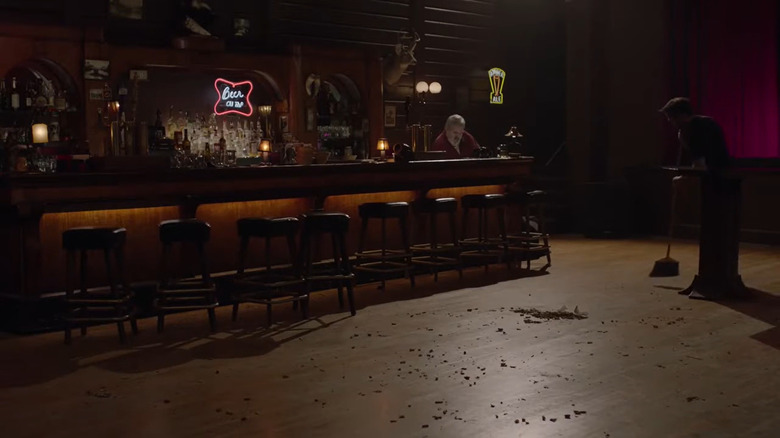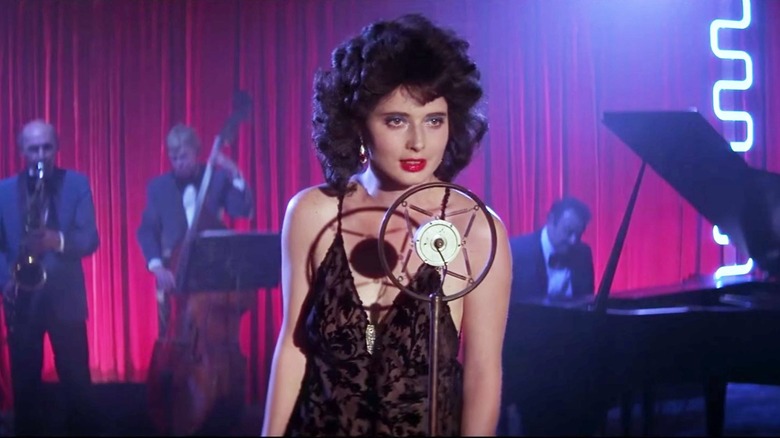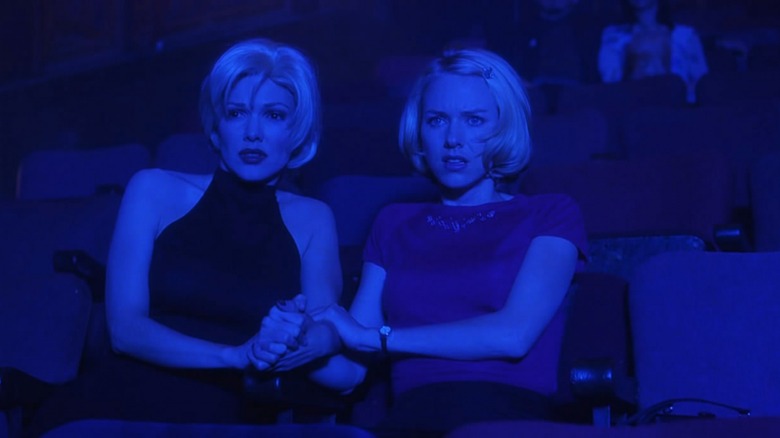
If you've seen only a few David Lynch works, you've probably already picked up the man's love of music. It's not just that he'll have a song playing in the background to set the mood, but he'll often seem to pause the plot completely for the sake of the song. The most famous example might be in "Part 7" of "Twin Peaks: The Return," in which an unnamed character at the Roadhouse spends a full minute of screen-time calmly sweeping the floor, as "Green Onions" by Booker T. and the M.G.'s plays in the background.
It's a moment that frustrated and bewildered some fans. As often is the case with Lynch's works, many viewers came up with elaborate theories for what the scene represented, which Lynch never confirmed or denied. (Personally, I just liked how invested the scene made me in this stranger's sweeping strategy.) The sweeper never turned out to be important to the larger story in any way, just as many of the scenes in the Roadhouse all season never turned out to have a lot of explicit significance.
"The Return" tended to end most episodes with a real-life band giving a performance in the Roadhouse, usually playing for a minute or so before the credits began to roll. (They would, of course, keep playing through the credits.) Whereas most serialized TV shows like to end their episodes with a neat character moment or a cool cliffhanger, the ending of a lot of these episodes felt like Lynch was saying to his audience, "Hey, check out this cool song that I like." This isn't a complaint, by the way: "The Return" was amazing.
'Music Is Magical'

A lot of this comes down to the fact that songs tend to be a massive source of inspiration for Lynch, in a way that he himself has trouble articulating. "Blue Velvet," one of his most famous and widely-acclaimed films, was inspired by the song of the same title by Bobby Vinton. "I didn't even like it when I first heard it but then later I listened to it and out comes a lot of things," Lynch said. The film features multiple scenes in which Dorothy (Isabella Rossellini) is singing a slower, sadder version of the song on stage, and the film slows things down and asks you to really listen to the song and feel all the little emotions evoked by her voice.
With most of the other movies in his career, Lynch can point to a song that served as one of the film's chief sources of inspiration. The director once noted:
"'Rammstein' for 'Lost Highway,' 'Dmitri Shostakovich' in 'Blue Velvet,' Chris Isaak's 'Wicked Game' for 'Wild at Heart.' You know, [in] pretty much every film there is some kind of music that will marry to those ideas, and you just have to try and find that. 'In Dreams', Roy Orbison, you know?"
Perhaps the biggest reason his work is so big on musical performances is because of how abstract music can be. Music can convey emotions so complex and specific that you can't really describe them with words, and that's also what attracted Lynch to cinema in the first place. "Cinema is a language. It can say things -- big, abstract things," Lynch once explained. Centering music into his films allows him to evoke emotions that standard plot and dialogue can't do on its own.
Club Silencio

Perhaps the best example of Lynch embracing the abstract nature of music is near the end of "Mulholland Drive," in which our two main characters are listening to a strange performance in a mysterious theater. The movie was unconventional enough as it was, but this was where any semblance the movie had of a traditional narrative fell to pieces. Rebekah Del Rio, an actual singer, comes on stage and starts singing "Llorando," a Spanish rendition of Roy Orbison's "Crying." Orbison's version is certainly sad, but Rebekah's is far more raw and emotional, and she gets to sing uninterrupted for a good three minutes straight.
Even though the rest of the movie's in English, her Spanish singing is not given any English subtitles because the words don't really matter. The scene's about the emotions her singing evokes, and the way we see Betty (Naomi Watts) react to her performance. The performance is a strange mix of sorrow, dread, a strange sort of the peacefulness mixed into it. It's not a sort of emotion that could effectively be put into words, but the emotion's undeniably there and it's nearly overwhelming.
This embrace of abstract emotion through music is part of what makes Lynch so beloved as a filmmaker today, and it's also what makes "Mulholland Drive" in particular one of his best. As Lynch put it about the uniqueness of film:
"You can express a feeling and a thought that can't be conveyed any other way. It's a magical medium. For me, it's so beautiful to think about these pictures and sounds flowing together in time and in sequence, making something that can be done only through cinema. It's not just words or music -- it's a whole range of elements coming together and making something that didn't exist before."
Read this next: The Best Movies Of 2021
The post David Lynch Just Can't Separate Music From His Movies appeared first on /Film.
0 Comments